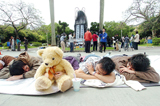National Taiwan University (NTU) students yesterday staged a demonstration on campus to protest the school’s decision to demolish several student dorms to make room for new academic research centers and more expensive housing for students.
“We were informed only last month that we have to move out of our dorm rooms because the school wants to construct new buildings for several research centers,” said Tseng Hsiang (曾翔), an NTU graduate student who lives in one of the condemned dorm halls. “As NTU students, we welcome the new facilities, but not at this cost to our welfare.”
Although the school also plans to construct new dorms, Tseng said it would cost too much to stay in the new facility. The monthly rent for one student in the current school-run dorms ranges from NT$875 to NT$2,250 including bills, depending on the type of room, while the new dorms, which will be constructed under a build-operate-transfer project run by a private firm, would cost students between NT$4,200 and NT$8,500 plus extra for bills, Tseng said, citing information provided by the Student Affairs Office.

PHOTO: GEORGE TSORNG, TAIPEI TIMES
“Graduate students who work as research assistants only make about NT$4,000 to NT$5,000 — how can we afford to stay in these new dorms?” Tseng said.
What has made the students even more upset is that the university did not involve them in the decision-making process.
“We, the students, didn’t know what the situation was — we were only told about the decision after it had been made,” Student Association president Hsu Ching-fang (?? said.
The research centers for mathematics, physics and astronomy are part of the university’s plans to boost its global ranking and make the top 100.
Graduate Institute of Building and Planning student Hsieh Sheng-yu (謝昇佑) said, judging by how the school handled the issue: “I would say that objective is an impossible dream.”
“The more important factor for improving a university’s academic status is the quality of the students, not constructing new buildings or getting new hardware,” Hsieh said. “Apparently, NTU did not consider their own students mature enough to be engaged as part of the decision-making process.”
In protest, students covered a bell tower on campus dedicated to late university president Fu Si-nian (傅斯年) with black sheeting.
“The student dorms were built by Fu because a lot of students from China had no place to stay after fleeing to Taiwan [with the Chinese Nationalist Party],” Hsu told reporters. “The NTU leadership today has insulted the spirit of care and love shown by Fu.”
An NTU official in charge of dormitory management, Hsu Huo-li (?Q), said the university would not alter its decision, but added that it would look after the students’ welfare.
“The university will hire trucks to help the students move and we aren’t forcing the [protesting] students to move into the new dorms — they’ll be allowed to stay in other inexpensive dorms run by the school,” Hsu Huo-li said.
However, Hsieh said that still didn’t solve the problem.
“We get to stay in inexpensive dorms because we protest, but the problem is still there and other students will eventually have to pay to live in the new expensive dorms,” he said.

ECHOVIRUS 11: The rate of enterovirus infections in northern Taiwan increased last week, with a four-year-old girl developing acute flaccid paralysis, the CDC said Two imported cases of chikungunya fever were reported last week, raising the total this year to 13 cases — the most for the same period in 18 years, the Centers for Disease Control (CDC) said yesterday. The two cases were a Taiwanese and a foreign national who both arrived from Indonesia, CDC Epidemic Intelligence Center Deputy Director Lee Chia-lin (李佳琳) said. The 13 cases reported this year are the most for the same period since chikungunya was added to the list of notifiable communicable diseases in October 2007, she said, adding that all the cases this year were imported, including 11 from

Prosecutors in New Taipei City yesterday indicted 31 individuals affiliated with the Chinese Nationalist Party (KMT) for allegedly forging thousands of signatures in recall campaigns targeting three Democratic Progressive Party (DPP) lawmakers. The indictments stem from investigations launched earlier this year after DPP lawmakers Su Chiao-hui (蘇巧慧) and Lee Kuen-cheng (李坤城) filed criminal complaints accusing campaign organizers of submitting false signatures in recall petitions against them. According to the New Taipei District Prosecutors Office, a total of 2,566 forged recall proposal forms in the initial proposer petition were found during the probe. Among those

The Mainland Affairs Council (MAC) today condemned the Chinese Communist Party (CCP) after the Czech officials confirmed that Chinese agents had surveilled Vice President Hsiao Bi-khim (蕭美琴) during her visit to Prague in March last year. Czech Military Intelligence director Petr Bartovsky yesterday said that Chinese operatives had attempted to create the conditions to carry out a demonstrative incident involving Hsiao, going as far as to plan a collision with her car. Hsiao was vice president-elect at the time. The MAC said that it has requested an explanation and demanded a public apology from Beijing. The CCP has repeatedly ignored the desires

The Ma-anshan Nuclear Power Plant’s license has expired and it cannot simply be restarted, the Executive Yuan said today, ahead of national debates on the nuclear power referendum. The No. 2 reactor at the Ma-anshan Nuclear Power Plant in Pingtung County was disconnected from the nation’s power grid and completely shut down on May 17, the day its license expired. The government would prioritize people’s safety and conduct necessary evaluations and checks if there is a need to extend the service life of the reactor, Executive Yuan spokeswoman Michelle Lee (李慧芝) told a news conference. Lee said that the referendum would read: “Do